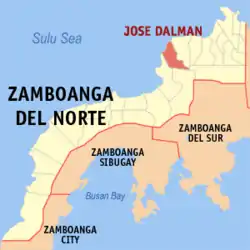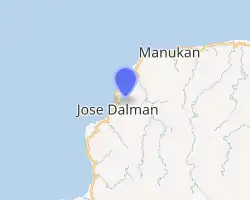Jose Dalman
Jose Dalman, officially the Municipality of Jose Dalman (Cebuano: Lungsod sa Jose Dalman; Subanen: Benwa Jose Dalman; Chavacano: Municipalidad de Jose Dalman; Tagalog: Bayan ng Jose Dalman), is a 5th class municipality in the province of Zamboanga del Norte, Philippines. According to the 2015 census, it has a population of 27,388 people. [3]
Jose Dalman | |
|---|---|
| Municipality of Jose Dalman | |
 Map of Zamboanga del Norte with Jose Dalman highlighted | |
OpenStreetMap 
| |
.svg.png.webp) Jose Dalman Location within the Philippines | |
| Coordinates: 8°27′N 123°02′E | |
| Country | |
| Region | Zamboanga Peninsula (Region IX) |
| Province | Zamboanga del Norte |
| District | 2nd District |
| Barangays | 18 (see Barangays) |
| Government | |
| • Type | Sangguniang Bayan |
| • Mayor | Rachel D. Ferrater |
| • Vice Mayor | Edwin A. Dalam |
| • Representative | Glona G. Labadlabad |
| • Electorate | 19,358 voters (2019) |
| Area | |
| • Total | 135.00 km2 (52.12 sq mi) |
| Elevation | 78 m (256 ft) |
| Population | |
| • Total | 27,388 |
| • Density | 200/km2 (530/sq mi) |
| • Households | 6,103 |
| Economy | |
| • Income class | 5th municipal income class |
| • Poverty incidence | 58.73% (2015)[4] |
| • Revenue | ₱130,314,858.39 (2016) |
| Time zone | UTC+8 (PST) |
| ZIP code | 7111 |
| PSGC | |
| IDD : area code | +63 (0)65 |
| Climate type | tropical climate |
| Native languages | Subanon Cebuano Chavacano Tagalog |
| Website | josedalman |
History
Jose Dalman was formerly known as Ponot, and was originally part of the municipality of Manukan. It was established as a separate municipality by virtue of Batas Pambansa Blg. 15, approved on January 3, 1979.[5] On April 8, 1983, through the effort of former Assemblyman Guardson Lood, Batas Pambansa Blg. 381 was enacted renaming Ponot to its current name after Jose Dalman, one of the former students of the national hero Jose Rizal during his exile in Dapitan.[6][7]
Barangays
Jose Dalman is politically subdivided into 18 barangays.
- Balatakan
- Bitoon
- Dinasan
- Ilihan
- Labakid
- Lipay
- Litalip
- Lopero
- Lumaping
- Madalag
- Manawan
- Marupay
- Poblacion (Ponot)
- Sigamok
- Siparok
- Tabon
- Tamarok
- Tamil
Climate
| Climate data for Jose Dalman, Zamboanga del Norte | |||||||||||||
|---|---|---|---|---|---|---|---|---|---|---|---|---|---|
| Month | Jan | Feb | Mar | Apr | May | Jun | Jul | Aug | Sep | Oct | Nov | Dec | Year |
| Average high °C (°F) | 29 (84) |
29 (84) |
30 (86) |
31 (88) |
30 (86) |
30 (86) |
29 (84) |
30 (86) |
30 (86) |
29 (84) |
29 (84) |
29 (84) |
30 (85) |
| Average low °C (°F) | 23 (73) |
23 (73) |
23 (73) |
24 (75) |
25 (77) |
25 (77) |
24 (75) |
24 (75) |
24 (75) |
24 (75) |
24 (75) |
24 (75) |
24 (75) |
| Average precipitation mm (inches) | 104 (4.1) |
76 (3.0) |
92 (3.6) |
97 (3.8) |
199 (7.8) |
238 (9.4) |
195 (7.7) |
193 (7.6) |
178 (7.0) |
212 (8.3) |
171 (6.7) |
110 (4.3) |
1,865 (73.3) |
| Average rainy days | 14.7 | 12.5 | 15.8 | 17.5 | 27.6 | 28.5 | 29.0 | 27.5 | 26.9 | 27.9 | 23.5 | 18.2 | 269.6 |
| Source: Meteoblue [8] | |||||||||||||
Demographics
| Year | Pop. | ±% p.a. |
|---|---|---|
| 1980 | 15,308 | — |
| 1990 | 17,952 | +1.61% |
| 1995 | 21,745 | +3.66% |
| 2000 | 23,322 | +1.51% |
| 2007 | 26,017 | +1.52% |
| 2010 | 27,033 | +1.40% |
| 2015 | 27,388 | +0.25% |
| Source: Philippine Statistics Authority [3] [9] [10][11] | ||
References
- Municipality of Jose Dalman | (DILG)
- "Province: Zamboanga del Norte". PSGC Interactive. Quezon City, Philippines: Philippine Statistics Authority. Retrieved 12 November 2016.
- Census of Population (2015). "Region IX (Zamboanga Peninsula)". Total Population by Province, City, Municipality and Barangay. PSA. Retrieved 20 June 2016.
- "PSA releases the 2015 Municipal and City Level Poverty Estimates". Quezon City, Philippines. Retrieved 12 October 2019.
- "Batas Pambansa Blg. 15". The LawPhil Project. Retrieved June 22, 2020.
- Batas Pambansa Blg. 381, PhilippineLaw.info, retrieved 2012 Archived 2012-05-19 at the Wayback Machine
- "Batas Pambansa Bilang 381 : BATAS PAMBANSA - PHILIPPINE LAWS STATUTES and CODES". Chan Robles Virtual Law Library. Retrieved June 22, 2020.
- "Jose Dalman: Average Temperatures and Rainfall". Meteoblue. Retrieved 30 April 2020.
- Census of Population and Housing (2010). "Region IX (Zamboanga Peninsula)". Total Population by Province, City, Municipality and Barangay. NSO. Retrieved 29 June 2016.
- Censuses of Population (1903–2007). "Region IX (Zamboanga Peninsula)". Table 1. Population Enumerated in Various Censuses by Province/Highly Urbanized City: 1903 to 2007. NSO.
- "Province of Zamboanga del Norte". Municipality Population Data. Local Water Utilities Administration Research Division. Retrieved 17 December 2016.
External links
- Jose Dalman Profile at PhilAtlas.com
- Philippine Standard Geographic Code
- Philippine Census Information
